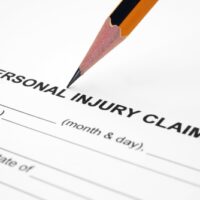Defense Puts Injured Plaintiff on Trial in NYC Personal Injury Lawsuit

Let’s say you are walking down the street near a building undergoing renovation when a piece of the building falls down and hits you on the head. You sue the people you believe are responsible and seek compensation for your injuries, which include orthopedic injuries, traumatic brain injury, memory loss, emotional injuries, cognitive impairment, and loss of enjoyment of life and social, educational and economic activities. Unless the defendants can show they weren’t responsible for causing the accident, they should be required to pay for your damages, right?
Unfortunately, it’s never that simple. One way the defendants have to avoid liability is to convince the jury that you are not injured as seriously as you say you are, or that at least some of your injuries existed before the accident occurred. And the courts give defendants the tools they need to accomplish that objective.
Courts give the parties in a lawsuit the power to force the other side to give them information before trial during a process called discovery. Through discovery, the other side can require you to produce documents such as medical records; to answer a set of written questions that they prepared ahead of time, known as interrogatories; and to take depositions, where the lawyers for the other side ask you questions in person and under oath and you are required to answer. You may also be required to respond to a bill of particulars, which is a list of written questions from the other side asking for details about your claim.
The defendants in the ongoing case of Zehri v. Bexin Management, Inc., which is described above, have requested many such items, including:
- mental health care records;
- pre-accident treatment records for two years prior to the accident;
- employment-related records;
- particulars regarding the plaintiff’s alleged inability to pursue her livelihood;
- discovery regarding witnesses, economic loss, insurance claims, and collateral reimbursement sources;
- online social media network information and access; and
- information regarding three other accidents that occurred around the same time.
The battle over the scope of discovery has been going on for many months. A hearing was held back in February based on an Order to Show Cause why the plaintiff should not have to respond to these requests. On June 28th, the judge ordered that the plaintiff comply with all of the discovery requests, with the possible exception of the plaintiff’s social media postings (e.g. Facebook) unless the defendants can demonstrate that the information will be relevant to the case.
Seek Experienced Legal Representation for Your NYC Personal Injury Case
Pre-trial motions and discovery can consume a great deal of time and energy devoted to the case, but this phase is at least as important as the trial itself. Information which is discovered or not discovered can cause a case to settle before trial, and the outcome of a motion can cause the case to be dismissed before it ever gets to trial. If you are injured in a construction accident or some other type of negligence, make sure you are represented by an experienced personal injury attorney who knows how to handle pre-trial motions and discovery requests. In New York City, contact Leandros A. Vrionedes, P.C. for a free consultation.


